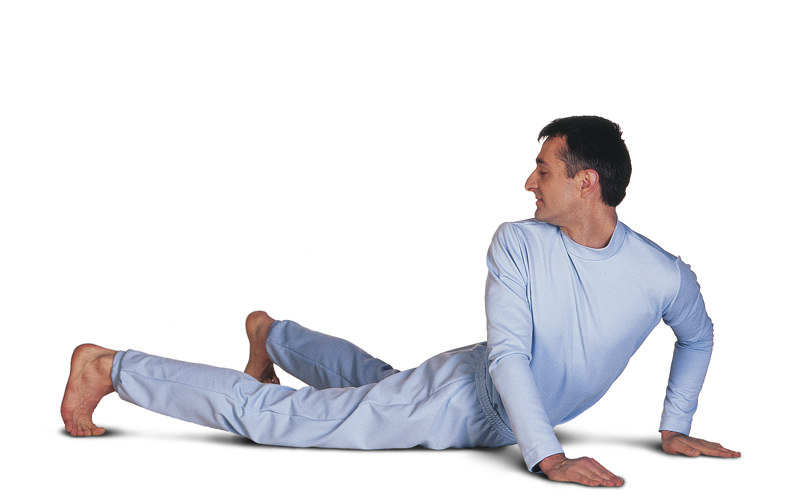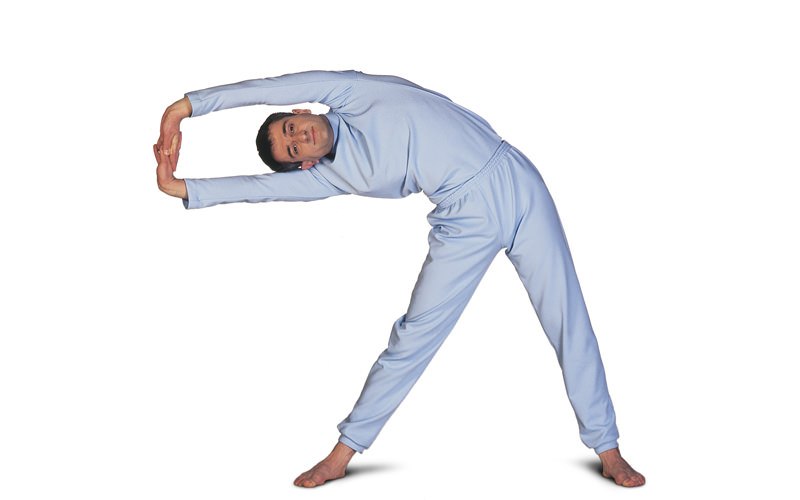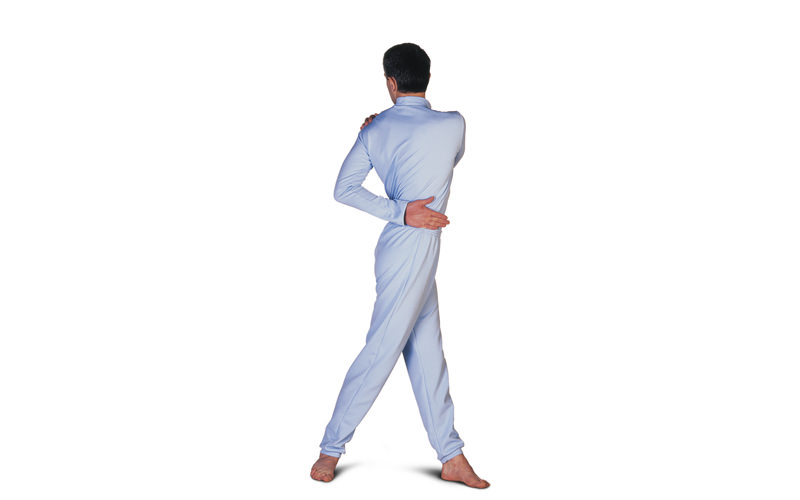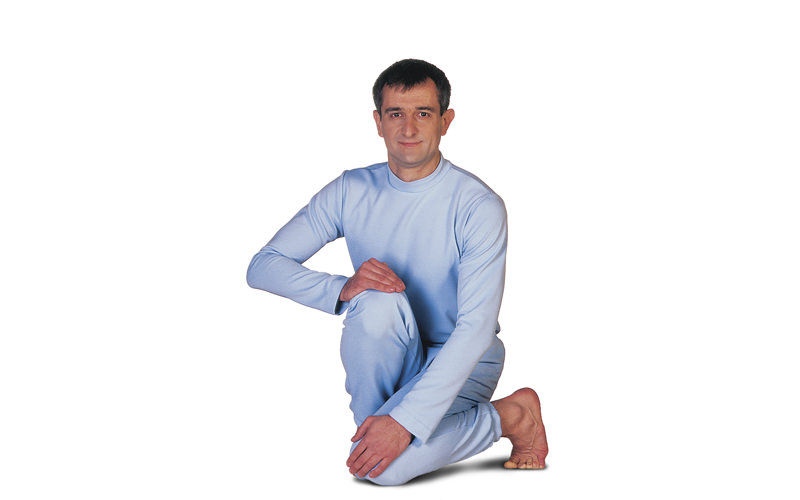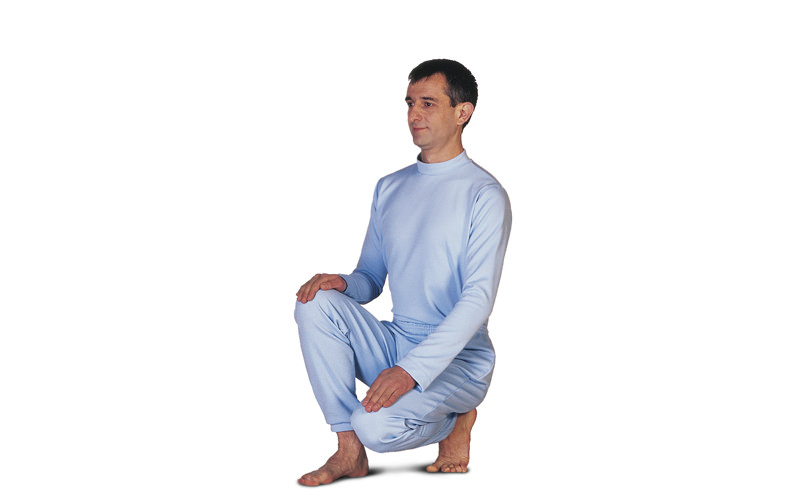Dhauti cleanses the upper digestive tract. Basti and Shanka Prakshalana evacuate the intestines and thoroughly cleanse the whole digestive system (from mouth to anus).
Basti
In earlier times Basti was performed in the river whilst sitting in a squatting position. With the assistance of Nauli water was sucked up into the intestines and then eliminated again into the river. Today this technique is applied as an Enema in order to cleanse the lower segment of the intestine.
Shanka Prakshalana
This technique is practiced in the morning on an empty stomach and, for the first three times, should definitely be practiced under the guidance of a teacher from “Yoga in Daily Life”.
Technique:
-
Gently warm six to seven litres of water to 34-40°C. Add 1/2 teaspoon of sea salt per litre of water (with high blood pressure use diet salt). The temperature of the water should be kept constant throughout the whole practice.
-
Quickly drink the entire quantity of water glass by glass. After each glass of water, practice five stretching and twisting exercises, such as Trikonasana, Triyak Bhujangasana, Sideways Bending of the Body, Meru Prishthasana and Tadasana.
-
After the fifth glass, go to the toilet and perform Ashvini Mudra (rapid contraction and release of the anal muscles). This Mudra stimulates peristalsis of the intestines.
-
Continue to drink the warm, salty water, glass by glass and practice the five Asanas and Ashvini Mudra till no more solid stools are passed. The whole process is only complete when one eliminates completely clean water from the bowel. The colour of the water may be yellowish, but it should contain no solid components.
-
Afterwards, cleanse the stomach, esophagus and bronchial tubes by means of Dhauti (but with unsalted water). In conclusion, practice Jala Neti to prevent headache. Relax for about 1 hour following the Shanka Prakshalana practice. Cover your body well, but do not fall asleep.
Caution:
The following diet is important. Khicheri should be eaten approximately 1 hour after Shanka Prakshalana - this can be prepared prior to relaxation.
Preparation of Khicheri:
Place 2 cups of Basmati Rice, 3/4 cup of hulled Mung Beans (Dal), 1/2 teaspoon Turmeric powder, 1/2 teaspoon Cumin seeds and salt in a pot, covered with three times the amount of water. Allow to simmer until it is tender. Mix in 1 dessert spoon of butter or clarified butter per serve. This food has the effect of providing a protective film on the intestinal tract and for this reason, as much as possible should be eaten. Do not drink for 2 hours after eating this meal.
Diet:
-
In the weeks that follow, eat only easily digestible food, as the intestines are very sensitive after this practice. For 7 days avoid milk, cheese, raw fruit and vegetables, black tea and coffee. For 20 days avoid gas-forming foods such as beans, cauliflower, cabbage, garlic, onions, hot spices and carbonated drinks. For at least 40 days avoid meat, fish, eggs and alcohol - however, for our health it is best to do without these completely.
-
In order that peristalsis of the intestines is stimulated, it is advisable to practice Agnisara Kriya or Nauli each day following the Shanka Prakshalana technique.
-
It is perfectly normal that no bowel movement takes place for two or three days following the practice. On the early morning of the next five days, one may choose to drink warm, unsalted water (four to five glasses), and after each glass perform the same exercises as with Shanka Prakshalana.
-
Shanka Prakshalana should be practiced 4 times a year, at the change of the seasons. At these times, our internal Biorhythm changes. Alternatively the technique can be practiced at least twice a year, mid-October till the beginning of November, and mid-March till the beginning of April.
Benefits:
Shanka Prakshalana purifies the blood, detoxifies the body and helps to develop good digestion. It eliminates allergies (e.g. hay fever) and skin diseases (e.g. acne, neurodermatitis or psoriasis). Further, it is helpful for springtime lethargy and has a balancing effect upon the mind.
Caution:
Shanka Prakshalana should not be practiced by persons under 15 years of age, during menstruation or pregnancy. It is to be avoided by persons with very low blood pressure, gastritis, ulcers, weak kidneys, large gallstones, kidney stones, chronic diabetes, hernia, or those with mental illness.
